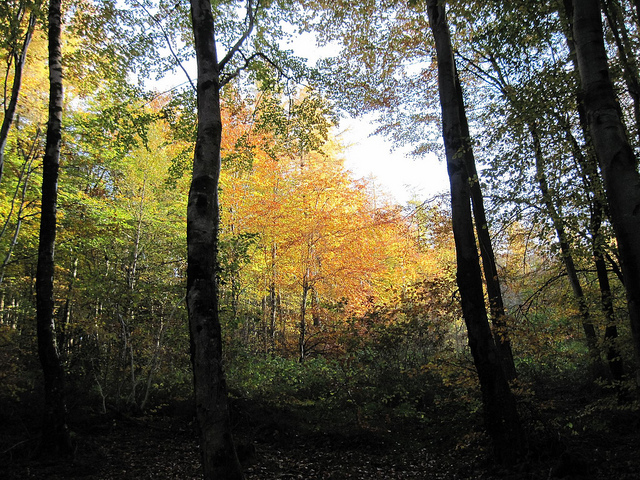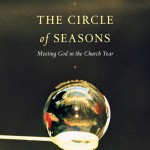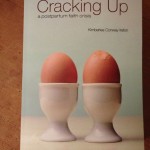
7
This Promise Land of plenty is not mine.
A foreigner I feel, a Moabite
At table eating Boaz’ food and wine—
I cannot raise my face to meet your sight.
Would I were noble, loyal, like good Ruth,
I’d clasp your feet upon the threshing floor—
No shame would mar my countenance; the truth
And faith and firmness of my state would pour
Like water, shine like light, from out my eyes
And you would wake and see and smile and stroke
My face—your work worn hands, so kind and wise,
Would gather me beneath your garment’s yoke.
I am no Ruth but Rahab scarlet stained—
In dreams alone is such a future gained.
—E.B., 1818
The next day was misty from dawn till dusk. Maggie felt tired these days and the grey light made her sleepy and her conversations with Gram and her parents last night had exhausted her, so after lunch, instead of going for her usual walk, she took a nap. That evening, as she washed up the dinner dishes, she could hear rain still splattering on the windows and occasionally hissing in the fire in the parlour. The baby kicked, hard enough to take her breath away for a moment. Only eight more weeks until her life changed forever.
No, her life had changed forever last July when she found out she was pregnant. She found she was no longer angry. Would she really have wanted never to come here? Never to know the feel of the wind from the river on her face or the blue of the sky above the emerald of the fields? Would she wish away these months with Gram, hearing her stories of growing up on these hills? Or the privilege of sorting through a century of her family’s belongings, touching each one, learning more about who she was because of this place she’d come from? Would she want never to have discovered E.B.’s sonnets? Not to have spent hours puzzling over who she was and what her story was? Never to have met James? Her heart shrank at the thought.
One by one she pulled the plates out of the rinse water and set them on the drying rack. No, she could not wish away these past months, no matter how dramatically her life had changed, was about to change. She wondered if E.B. had felt that same way, felt glad somehow for the pain and shame she endured because of where it brought her in the end? In this house, she had met compassion and kindness. Here, she had loved—someone—probably the son mentioned in the fifth sonnet. Did he love her in return? What had happened to him? What had happened to her? To her baby? Maggie didn’t know the end of E.B.’s story. Gram had said all those months ago that there was a family Bible around here somewhere, and perhaps it held a clue to E.B.’s identity, to her future, but they still hadn’t unearthed it. Maggie wondered if it even existed anymore.
A knock sounded on the kitchen door. She dried her hands on a dish towel and went to answer it. James stood on the stoop, dripping. “I didn’t see you today, and I wanted—” He looked around and lowered his voice. “I wanted to hear how your conversations went yesterday.”
Maggie invited him in and put the kettle on for tea. As they waited for the water to boil, she finished rinsing the dishes and told him of her conversation with Gram, which had gone far better than she’d expected. And her parents, though disappointed, bore the news with remarkable calm. “They’re concerned for me, of course,” she said, drying her hands. “This isn’t the path they imagined for me.” The kettle whistled and she poured the water into the teapot. “It isn’t the path I imagined for myself.” She rested her hands on her belly, gently, tenderly.
James said, “I never imagined I’d become a sheep farmer—not in a million years.”
Maggie glanced up at him. He was looking at her hands on her belly. She wondered if he were thinking of his own unborn child, of the life he might have had, and in that moment she knew she loved him. When he met her gaze, a question in his eyes, her smile was a little wobbly, but she took his hand and rested it on her belly. After a moment, the baby kicked, a one-two punch that made them both grin.
“Sometimes,” James said, “the path chooses us, and it’s better than what we’d have chosen for ourselves.”
~
It continued to rain for three days. The river rose, half the roads were flooded out, and power lines and phone lines were down all over the county. Isolated from the world by flood and phone failure, Gram and Maggie finished cleaning one of the upstairs bedrooms, the one closest to Maggie’s. She smiled as she scrubbed the last of the dust from the floor planks. It would make a fine room for the baby, once there were curtains in the window and a rug on the floor. There was already a crib in the corner, and a rocking chair. Helen had thrown away nothing, it seemed, and Maggie was increasingly glad of that.
After supper on the third day, when the rain was coming down harder than ever—the fire in the parlour hissed loudly every few seconds as a raindrop made its way down the chimney and into the flames—Gram had gone upstairs with a headache and a cup of tea, and Maggie sat quietly on the sofa, watching the fire dance and sing. A knock on the kitchen door pulled her from her reverie. She heaved herself off the sofa and went to answer it.
“James!” she cried when she saw him, drenched and dripping, on the stoop. “You’re soaked through!” She stepped aside and gestured him into the kitchen. “What on earth possessed you to come out on a night like this?”
“I haven’t seen you in three days.” He shrugged off his coat and hung it on a peg by the door. “I missed you.”
It wasn’t just the words. It was the tone, the tenderness of it.
Maggie’s heart lurched into her throat and she found that she could not speak. It took several swallows to return it to its proper place.
“Come,” she was finally able to say, and led the way into the parlour. “Sit by the fire and dry off. I’ll make you a cup of tea.”
When the tea was ready, Maggie brought it and the cups on a tray to the parlor and set them on the low table in front of the sofa. She found that she could not look at James as he crossed the room to sit down beside her, and that her hand trembled a little as she poured the tea.
They sat in silence, sipping their tea and staring into the fire. But after a few moments Maggie found she did not mind. The silence was strangely comforting, and she slowly ceased to be aware of it. She finished her tea, set down her teacup, and leaned back on the sofa. The fire hissed and popped. The baby stirred. James reached over and clasped Maggie’s hand in his.
Her heart slammed into her ribs at his touch, and she looked at him sharply, but he was still gazing into the fire, seemingly unconscious of what he had just done.
“James?” she said after a moment.
“Aye?”
“You’re holding my hand.”
A smile played at the corners of his mouth, but he still did not look at her. “Aye. Does it bother you?”
“No,” Maggie said slowly. In fact, she rather liked it. If the tattooing of her heart was any indication, she liked it a lot. “But I’d like to know what you mean by it.”
He looked at her then. “I mean to marry you if you’ll let me.”
For one moment all the air seemed sucked out of the room. Maggie felt plastered in place. She could neither breathe nor speak nor think. Then—“Marry me! But we—you—I—I’m pregnant! And—and you—you don’t know me well enough!”
James squeezed her hand. “I know you’re pregnant. I’ve known it almost as long as I’ve known you—ever since the day you showed me those sonnets that you’ve been carrying around in your pocket.”
Maggie felt her cheeks flame.
“And I’ve spent part of almost every day for the past six months with you, Maggie. I know you well enough to know that you’re brave and adventurous and loyal and kind. I’ve seen the way you treat your Gram, the way you treat Floss and the sheep. I’ve seen the way you’ve wrestled silently with your anger toward Brian and never once maligned him.”
“But I have! Oh James, you don’t know how hateful my thoughts toward him have been!”
“But you’re not giving in to those thoughts, Maggie. Of course they’re there, but you’re fighting them—you’re wrestling them to the ground and pinning them there. You’re not letting them rob you of laughter and joy and love. You love that baby—and—I think you love me—perhaps not as much as I love you—perhaps not in the same way—”
“Oh, James.” Maggie’s voice was a teary whisper.
“I know that marrying a Scottish sheep-farmer wasn’t in your plans, Maggie, any more than moving to England or having a baby was in your plans. It certainly wasn’t in my plans to fall in love with a poetry-loving American lass and her baby. But you’ve become part of the fabric of my life, Maggie; you’ve woven yourself right into it.”
“Oh, James,” she said again, still teary but almost smiling.
James squeezed her hand again and rested his other hand on her cheek. “I love you, Mary Magdalene Lowell. Be my wife?”
Maggie’s heart was thumping so hard she could barely speak. “Oh, James.”
James grinned. “You’ve said that three times now, Maggie. Do you think you could say something else?”
Maggie grinned through her tears. “Yes,” she whispered.
“Yes?”
“Yes.”
Photo by Joysaphine, Creative Commons via Flickr.

